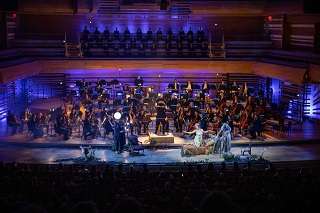|
Back
Orchestre symphonique de Montréal Presents Mendelssohn’s Complete Midsummer Night’s Dream with Excerpts from Shakespeare’s Play Montreal
Maison symphonique de Montréal, Place des Arts
09/21/2022 - & September 22*, 2022
Claude Debussy: Nocturnes
Felix Mendelssohn: A Midsummer Night’s Dream: Overture, Op. 21, & Incidental Music, Op. 61
Anna‑Sophie Neher (Soprano), Rose Naggar‑Tremblay (Contralto), Samuel Côté (Theseus, Oberon), Sofia Blondin (Hyppolita, Titania), Mattis Savard‑Verhoeven (Lysander), Rebecca Vachon (Hermia), Simon Beaulé‑Bulman (Demetrius, Bottom), Valérie Tellos (Helena, Quince), Tiffany Montambault (Puck)
Catherine Vidal (Adaption of McBurney’s text, and Direction), Patrice Charbonneau-Brunelle (Staging and Costumes), Chantal Labonté (Lighting), Marisol Vachon (Assistant, Staging and Costumes), Gerard McBurney (Original Adaption), Michelle Allen (Translation of Shakespeare’s text)
Chœur de l’Orchestre symphonique de Montréal, Andrew Megill (Chorus Master), Orchestre symphonique de Montréal, Rafael Payare (Conductor)

(© Antoine Saito)
Rafael Payare offered a unique second program this week in his first year as Music Director of the Orchestre symphonique de Montréal (the Orchestra apparently triumphed in last week’s season opener, Mahler’s 2nd, which I couldn’t, unfortunately, attend). The OSM brought together Mendelssohn’s Overture and Incidental Music to A Midsummer Night’s Dream (first time performed in its entirety by the OSM) with excerpts from Shakespeare’s play for 75‑minutes of fairy‑like enchantment.
Overall, the production (texts chosen and set to the music by Mr Payare), was judiciously and seamlessly mounted. The young troupe of actors had all the tools necessary for bringing the play to life– enthusiasm, clear diction (the voices were miked) and great timing, aided by the felicitous lighting from Chantal Labonté, as well as costumes and sets by Patrice Charbonneau-Brunelle. The Orchestra, however, did not quite attain the same heights. Their playing was sometimes muddy and imprecise, especially in the Overture, Nocturne and Wedding March. (The brass were not at their best.) A wedding procession during the march would have been welcome; marriages are not very convincing when there is no one in attendance.
Payare opened the concert with Debussy’s impressionistic masterpiece, Nocturnes, composed in 1900 and in the same vein and period as Prélude à l’après‑midi d’un faune. Payare drew some exquisite sounds from the Orchestra in “Nuages,” but “Fêtes” lacked cohesion and “Sirènes” was most deceiving. The lack of spirit and magic almost reduced the piece to banality. At times Payare let the brass get away from him and the choir typically overpowered the Orchestra, thus drowning out many orchestral details.
The women’s section of the OSM Chorus was well prepared by Chorus Master Andrew Megill. Soprano Anna‑Sophie Neher and contralto Rose Haggar‑Tremblay both sang with joyful confidence from the choir loft in front of the chorus. (One chorus member was masked against Covid, very few in the Orchestra and, as well, very few in the audience.)
This evening’s performance included a special occasion—the retirement of long-time Concertmaster Richard Roberts. Roberts had been concertmaster for the past 40 years and this was his final concert with the OSM. He participated in 50 world tours and some 100 recordings. Interestingly, members of the Orchestra did not join the audience in their standing ovation. And, strangely, his name had already been removed from the list of orchestra members in the program before he had even finished his tenure.
Excerpts from the play were performed in French without surtitles in French or English.
Earl Arthur Love
|